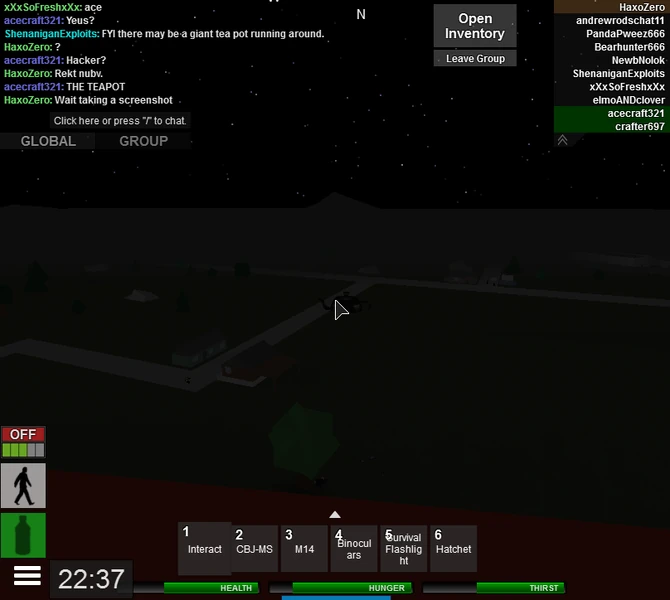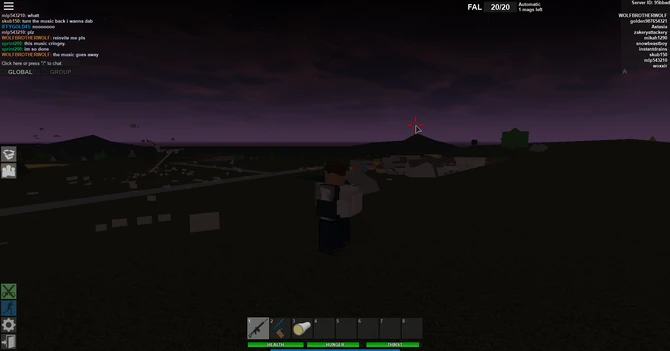Overview
| Many people enjoy playing Apocalypse Rising as shown by the 587K+ Favorites, 1 Million+ Visits, and 149K+ Likes. Many people get good gear and dominate a server, while others just walk around killing zombies. However, a minority of players exploit the game, and may be banned at Apocalypse Rising admins discretion. A list of exploits can be found below.
Exploits are malicious events that ruin the game for the majority of non-exploiters. They used to ruin the game by forcing Gusmanak to reset all character stats, equipment, and clothing of all players. Exploiters will sometimes build bases, which are made out of a large amount of Stone Walls and Wooden Planks (more than you would expect from a normal Base), with Floodlights around it. Exploiter bases should be avoided, as you will most likely get killed and any items that you pick up inside can potentially mark you as an Exploiter. Exploiters have an arsenal of measures against being caught. These include: group chat, name changing, the ability to remove their name from the Player List, and having multiple alternate accounts. |
Types of Exploits
| Vest: Keep stats after death; corpse does not drop loot
Health: Infinite health (exploited admin commands, countered by modifying script that grants admin rights). Speed: Ability to move at above normal speeds on foot (DLL injection, countered by server scripts to check speeds at regular intervals). Teleporting: Ability to teleport you to the exploiter (exploited admin commands, countered by modifying script that grants admin rights). One Shot: Weapon damage numbers are greatly increased (DLL injection, countering method is unknown). Player Name: Manipulate player name and list of players in-game (most likely DLL injection, countering method is unknown). Spawn-in: Ability to spawn items into the game on a non-VIP server (exploited admin commands, countered by modifying script that grants admin rights). Indirect: Removing possible spawnable items (most likely DLL injection, countered by converting item spawn script to activate server-side). Lagswitch: Exploiter disconnects his own client, damage done to his in-game character is null due to lack of player, exploiter's actions are listed in the client, and sent to the server upon reconnection (basic disconnection, ROBLOX counters by kicking player after a few seconds of disconnection, cannot decrease amount of seconds due to kicking of players with accidental lag). Invisible: Ability for character to not render to other players (most likely DLL injection, countering method is unknown). Noclip: Ability to enter blocks, being within blocks does not register as raycast collision when shooting from within (most likely DLL, also possibly exploited admin commands). Shutdown: Ability to disconnect a client from the server, if client has engaged in a battle, will result in data loss due to "combat logging" (majority of network-flooding methods possible, but most feasible for most players is exploited admin commands to kick players). Killball: Ability to set health of all players in server to zero (equal probabilities of DLL injection and exploited admin commands). Forcefield/Protection: - TBA |
FOLLOWING ANALYSIS, IT HAS BEEN DEEMED THAT APOCALYPSE RISING REMAINS VULNERABLE TO CLIENT-SIDE EXPLOITING AND CODE INJECTIONS. THIS ARTICLE HAS NOW BEEN DE-STRIKED. - Godonan
Exploitings now rarely occur. Thanks to the Apocalypse Rising team, most, if not all calculations are based in Roblox servers. Running code injections or programs that modify client files no longer work. Currently, the only exploits possible are those that take advantage of bugs in the game, not due to programs.
Roblox-server based calculations have the same security as calculations based on the amount of Robux you have. This reasoning also means that altering client files looks as if values have been changed, but once a transaction is made, the calculation is deducted based on server variables.






